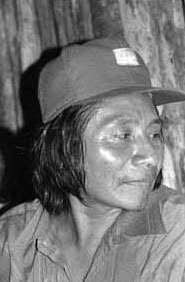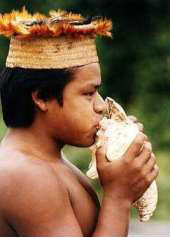Co-editors: Seán Mac Mathúna • John Heathcote
Consulting editor: Themistocles Hoetis
Field Correspondent: Allen Hougland
Colombia:
Three Human Rights Activists Kidnapped and
Slain Amnesty
International report blames FARC for
killings The
three indigenous human rights activists murdered in
Colombia The California based Occidental
Petroleum is planning to drill for oil in the traditional
territory of the U'wa, an indigenous community of 5,000
people living in the cloud forests of the Colombian Andes
Orinoco basin. The Traditional U'wa Authority are
unanimously opposed to mining on land they consider sacred.
If Occidental proceeds with development, the U'wa are
threatening to collectively leap from a 1,400 foot cliff in
the Andes mountains. Occidental's oil development
plans threaten the physical and spiritual worlds of the
U'wa, bringing roads, more colonists, and violent conflict
into U'wa territory. Colombia's largest left-wing guerrilla
groups (such as FARC, who now control much of the
countryside) have declared Occidental a military target. The
US trained Colombian army, notorious for its human rights
atrocities, publicly declared that it will occupy the U'wa
territory to protect oil reserves; which at most would
supply the United States for three months. The violence and environmental
devastation surrounding the Occidental/Shell pumpstation in
Arauca, just east of the U'wa territory, is a clear
illustration of why oil development should not occur in
Samore: The U'was firmly oppose
the digging and have warned that there will be an
increase in violence as has occurred in other Colombian
petroleum regions. Despite these threats, Los
Angeles-based Occidental Petroleum and the Colombian
government are going ahead with their excavation plans.
The U'was have issued a
call for help to the international community. Now is the
moment for us to answer their call. The U'was' opposition to
the petroleum project is so strong that they have made a
pact among themselves to commit group suicide if
Occidental and the Colombian government proceed with the
project on their ancestral land. The U'was, a tribe of
over 5,000 members, explain that they prefer to kill
themselves than to die slowly from the environmental and
cultural death that petroleum production brings to them.
The central cultural and spiritual creed of the U'was is
that the earth, which has sustained them for centuries,
is sacred. They firmly believe that if oil exploration is
allowed on their sacred land, the balance of the entire
world will be disturbed. In the U'was' own words,
"Petroleum is the blood of the earth… drilling for
oil is for us worse than killing our own mother. If we
kill the earth no one will be left alive." The struggle of the U'was
exploded into public view recently with the tragic
assassination in Colombia on March 5, 1999 of three
indigenous activists: Terence Freitas, Ingrid
Washinawatok, and Lahe'ane'e Gay. (Lahe'ena Gay was the
director of the Hawaii-based Pacific Cultural Conservancy
International, Ingrid Washinawatok a native American and
Terence Freitas an environmental scientist who had been
coordinating the international campaign in favour of the
U'wa indigenous group since 1997 and had visited Colombia
on several previous occasions). Terence dedicated the
final two years of his life to the U'was' campaign to
stop Occidenatal's project, reclaim their ancestral land,
and protect their traditional culture. Ingrid and
Lahe'ane'e were working with the U'was to start an
educational program designed to sustain and promote their
traditional way of life. The U'was fear that the
recent assassinations are no more than a precursor to the
increase in violence that the petroleum project will
bring to their people. In Colombia, oil and violence are
inexorably tied together. Occidental's Caño
Limón pipeline, just north of the U'was land, has
been attacked by guerrillas more than 500 times in its 12
years of existence, spilling approximately 1.7 million
barrels of crude oil on the ground and in the rivers. The
Colombian government has militarized the areas of
petroleum production and the pipelines, often persecuting
the local population who the government claims is helping
the guerrillas (FARC). Petroleum projects have
already affected other indigenous groups in Colombia,
such as the Yarique, the Kofan, and the
Secoya. The present excavation
plans threaten the survival of both the U'was and their
environment. The native land of the
U'was, a cloudy forest in the Sierra Nevada del Cocuy
near the Venezuelan border, is one of the most delicate
and most endangered forest ecosystems on the planet. The
area is rich in flora and fauna unique to the region and
the U'was depend on the balance and abundance of the
forest for their survival. Other regions of the Amazon
basin where oil companies have operated have witnessed
cultural decay, toxic pollution, invasions onto private
land, and monumental deforestation. Occidental first received
a license to excavate in 1992 for a two-million-barrel
oil-field, the equivalent of the United States
consumption for three months. Since then the U'was have
constantly opposed the project and have taken a variety
of actions to stop it, including demands on the Colombian
government, petitions asking the Organization of American
States to intervene, direct appeals to the top executives
at Occidental, and contacts made with that company's
shareholders. At this time the
Colombian Ministry of Environment is considering
Occidental's request for an excavation license, the next
obstacle the company must overcome to continue the
project. Given the growing
violence in the region and Occidental's pressure on the
government to approve the excavation license, the urgency
of the U'was' struggle has never been greater. "We are
seeking an explanation for this 'progress' the runs
contrary to life. We demand that this kind of progress
stop, that oil exploitation in the heart of the earth
halt, and that the deliberate bleeding of this planet
come to an end." Statement of the U'wa
people, August, 1998 Translation ©2000 by Allen
Hougland
"Oil is
the blood of Mother Earth . . . to take the oil is,
for us, worse than killing your own mother. If you
kill the Earth, then no one will live."

"They put
their guns to my head and demanded that I sign the
agreement or lose my life. I said, kill me, kill me
now. I cannot sign anything away for my tribe." -
Roberto Cobaría, President of the Traditional
U'wa Authority (July, 1997)




The U'was, a people
indigenous to the Colombian forest, are fighting a
life-and-death battle to protect their sacred sites and
their traditional culture from a petroleum project
scheduled to commence on their land at any
moment.